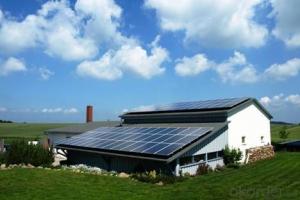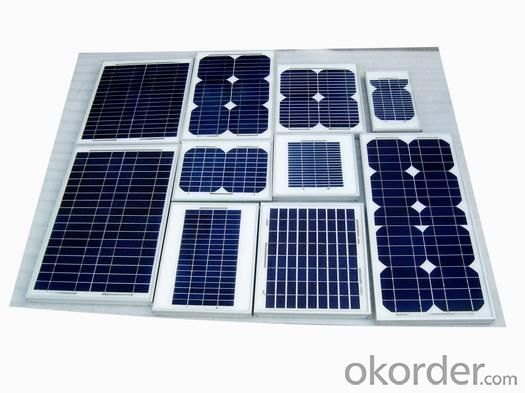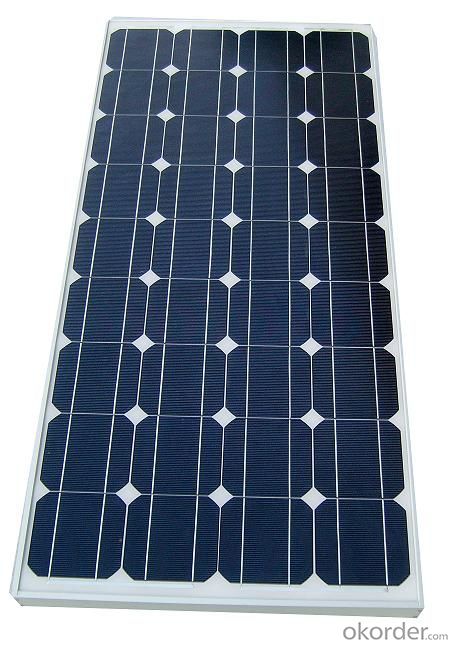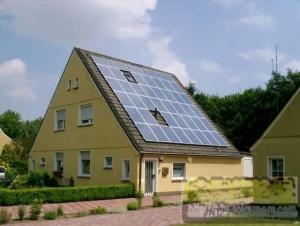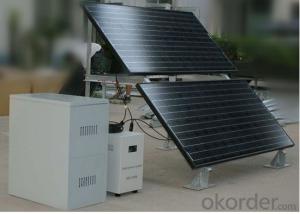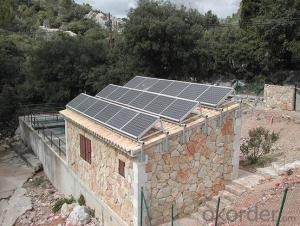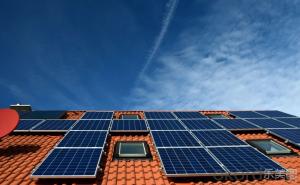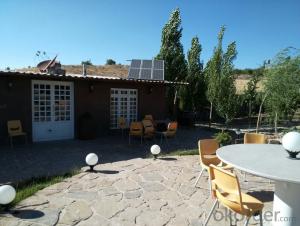Solar Energy Systems Oman:5kW Off-Grid System for Long Useful Time
- Loading Port:
- Shanghai
- Payment Terms:
- TT OR LC
- Min Order Qty:
- 20 set
- Supply Capability:
- 2000 set/month
OKorder Service Pledge
Quality Product, Order Online Tracking, Timely Delivery
OKorder Financial Service
Credit Rating, Credit Services, Credit Purchasing
You Might Also Like
Specification
Application:
Home
Output Voltage (V):
220
Solar System 5KW Made in China Off-Grid System
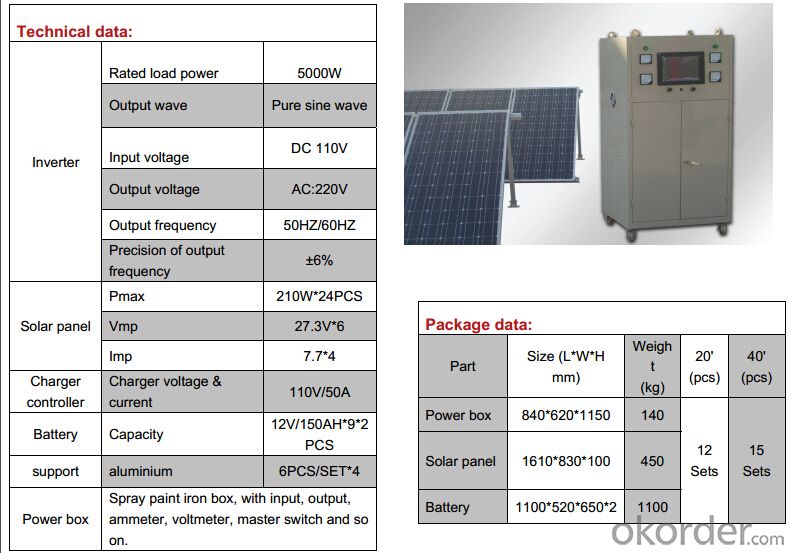
Solar system advantages:
1. CE, ROHS approved.
2. High conversion efficiency, high-transmission rate.
3. Energy saving, environmental-friendly.
4. Advanced technology, strict quality control system.
5. Easy installation, safe operation, free maintenance.
6. Low MOQ, fast delivery time, long service life.
System Device | |
| No | Device name |
| 1 | solar panels |
| 2 | inverter( off grid and on grid) |
| 3 | mounting system |
| 4 | combiner box |
| 5 | cable and other accessories |
| Quick Details | |||||
| Specification: | Mini | Application: | Home | Output Voltage (V): | 72V |
| Load Power (W): | 3.5-4.2KW | Solar Power (W): | 2KW | Work Time (h): | 4-5days |
| Packaging & Delivery | |
| Packaging Detail: | carton pallet |
| Delivery Detail: | within 7 days |
| Specifications | |||||
| 2KW Solar Power System | |||||
| Lifespan >20 years | |||||
| Designed to meet the needs for low power household appliances | |||||
| Base on your situaion ,we design the solar power system as following : | |||||
| 1: PV-system DC voltage level: DC 48V ,ouput AC voltage level: AC220V 50/60HZ | |||||
| 2: load Working time every day: 840W 5hours(3.5-4.2KW*h/day) | |||||
| 3: Primise rainy days: 2 days | |||||
| 4:PV system power Max Input Power: 2KW/DC72V Max AC Output Power: 2000W AC220V 50/60HZ,opration output power:inductive load <=1KW Resistive load:1.6KW | |||||
| 5: PV Array specification: Voc:DC86.4V Vmp:72V Isc:30A Imp:27.8A |
| Name | Type | Number | Remarks |
| MONO-Solar panel | JX200M/36V 1580*808*35mm | 10 | 2KW connection: 2 Series, 5 In parallel |
| Battery | 12V200Ah | 8 | Gel batteries The total capacity:DC48V/400Ah |
| PV-inverter | JX-2KW | 1 | inputDC48V -outputAC220V 50/60HZ,city power automatic switch |
| PV support | JX-S200-10 | 1 | 10 Pcs solar panels use a PV support , Material: Hot -dip galvanized |
| Battery box | JX-C24 | 1 | size:780*800*900mm 4layerdetachable type |
| PV Controller | CM4860 | 1 | DC48V 60A , RS485 communication function |
| PV cable,connect bettwen | PV-1*4.0mm2 | 100 | PV -specific single-core copper 4.0 mm2 cable,Double protection cover 100M |
| Power cable | BVV-1*16mm2 | 50 | single-core copper 16 mm2 cable,Double protection cover |
- Q: How does a solar energy system work?
- A solar energy system works by harnessing the power of the sun through solar panels, which consist of photovoltaic cells. These cells convert sunlight into direct current (DC) electricity. The DC electricity is then converted into alternating current (AC) through an inverter, making it suitable for use in homes and businesses. The electricity generated by the solar panels can be used immediately, stored in batteries for later use, or fed back into the grid. This renewable energy system helps reduce reliance on fossil fuels and contributes to a cleaner and more sustainable energy source.
- Q: Are solar energy systems environmentally friendly?
- Yes, solar energy systems are environmentally friendly. They produce clean and renewable energy by harnessing the power of the sun, which reduces the reliance on fossil fuels. Solar energy systems do not emit greenhouse gases or other harmful pollutants during operation, making them a sustainable and environmentally responsible choice for generating electricity.
- Q: Can solar energy systems be used in powering retirement homes or assisted living facilities?
- Retirement homes and assisted living facilities can indeed utilize solar energy systems to power their operations. These facilities face a substantial energy demand for heating, cooling, lighting, and electrical appliances. However, by installing solar panels on rooftops or suitable areas, these facilities can generate their own electricity and decrease their dependence on the grid. The implementation of solar energy systems offers significant advantages for these establishments. One notable benefit is the potential for substantial cost reduction, as solar power can offset a significant portion of their electricity bills. This aspect is especially crucial for retirement homes and assisted living facilities, which operate on limited budgets and must allocate resources efficiently. By harnessing solar power, these facilities can redirect the saved funds toward providing enhanced care and services for their residents. Moreover, solar energy systems contribute to a cleaner and more sustainable environment. Retirement homes and assisted living facilities bear a responsibility to promote their residents' well-being, and the utilization of solar power enables them to reduce their carbon footprint. This environmentally friendly approach can positively impact the health and overall quality of life for the residents. Additionally, solar energy systems serve as a reliable power source during emergencies or power outages. In areas prone to extreme weather events, where power disruptions are frequent, having a solar energy system with battery storage ensures a continuous and uninterrupted power supply to critical areas such as medical equipment, lighting, and HVAC systems. In conclusion, solar energy systems offer a feasible and advantageous solution for powering retirement homes and assisted living facilities. These systems can significantly decrease operating costs, promote sustainability, and provide a reliable power source, ultimately enhancing the quality of care and services provided to residents.
- Q: Can a solar energy system be installed on a building with a metal roof?
- Yes, a solar energy system can be installed on a building with a metal roof. Metal roofs are actually a popular choice for solar installations due to their durability and ability to withstand the weight of solar panels. Special mounting systems can be used to secure the panels to the metal roof without causing any damage.
- Q: What are the environmental impacts of manufacturing solar panels?
- The manufacturing of solar panels has both positive and negative environmental impacts. On the positive side, solar panels produce clean and renewable energy, reducing the demand for fossil fuels and mitigating greenhouse gas emissions. This helps combat climate change and air pollution, which are major environmental concerns. However, the production process of solar panels is not entirely without negative consequences. The initial stage involves the extraction and processing of raw materials, such as silicon, silver, aluminum, and glass, which can have environmental impacts. Mining for these materials can lead to habitat destruction, soil erosion, and water pollution if not properly managed and regulated. Moreover, the manufacturing process itself requires energy, which is often derived from conventional power sources like coal or natural gas. This can contribute to carbon emissions and air pollution during the production phase, offsetting some of the environmental benefits of solar energy. Additionally, the disposal of solar panels at the end of their life cycle can pose environmental challenges. Most solar panels contain hazardous materials, such as lead and cadmium, which can leach into the soil and water if not properly handled. Ensuring proper recycling and disposal methods for end-of-life solar panels is crucial to minimize potential environmental harm. Despite these concerns, it is important to note that the environmental impacts of manufacturing solar panels are relatively minimal compared to the long-term benefits they offer in terms of clean energy generation and reducing greenhouse gas emissions. Continuous advancements in technology and manufacturing processes are also helping to minimize the environmental footprint of solar panel production. Overall, while there are some environmental consequences associated with manufacturing solar panels, their positive impacts on reducing carbon emissions and promoting renewable energy far outweigh the negatives. It is essential to continue investing in research and development to further improve the sustainability of solar panel production and address any potential environmental challenges.
- Q: Can solar energy systems be used in areas with limited access to healthcare?
- Indeed, areas with limited access to healthcare can definitely benefit from the use of solar energy systems. In fact, the utilization of solar energy systems can play a vital role in enhancing healthcare services in such areas. Solar energy systems have the capability to provide power to medical facilities, including hospitals, clinics, and health centers, ensuring a consistent and uninterrupted supply of electricity. This becomes particularly significant in remote or off-grid locations where the availability of power from the main grid is scarce or non-existent. By offering a sustainable and autonomous energy source, solar systems can help overcome the obstacles caused by unreliable or inadequate power supply, which often hinder the provision of healthcare services. The use of solar energy can enable the powering of essential medical equipment, such as diagnostic tools, laboratory machines, and refrigeration units for storing vaccines and medications. This empowers healthcare providers to deliver crucial services, including diagnostics, treatment, and emergency care, even in areas where conventional power sources are limited. Additionally, solar-powered medical equipment can be easily transported and mobile, facilitating healthcare workers' access to remote areas and allowing them to provide primary healthcare services to underserved populations. Furthermore, solar energy systems can be employed to provide lighting in healthcare facilities, especially in areas where electricity is scarce or unavailable during nighttime. Sufficient lighting is vital for performing medical procedures, conducting surgeries, and delivering babies safely. Consequently, solar-powered lighting systems can contribute to the overall well-being of healthcare workers, enabling them to work in well-illuminated and comfortable environments. Moreover, solar energy systems can power communication devices, such as phones and radios, empowering healthcare workers to connect with experts and access medical information, even in areas with limited connectivity. This can facilitate telemedicine initiatives, where healthcare professionals can conduct remote consultations and diagnosis, further enhancing healthcare access in areas with limited healthcare infrastructure. In conclusion, solar energy systems provide a sustainable and dependable solution for powering healthcare facilities and enhancing healthcare services in areas with limited access to healthcare. By supplying electricity to medical equipment, lighting, and communication devices, solar systems can contribute to improved healthcare outcomes, increased efficiency, and enhanced accessibility to vital medical services in underserved communities.
- Q: What is the role of solar energy in achieving energy independence?
- The role of solar energy in achieving energy independence is crucial. Solar power is a renewable and abundant source of energy that can be harnessed to generate electricity and heat. By utilizing solar energy, nations can reduce their reliance on fossil fuels and imported energy sources, thereby achieving greater energy independence. Solar panels installed on rooftops, in fields, and in solar farms can produce clean and sustainable electricity, reducing the need for traditional power plants. Additionally, solar energy can be utilized in off-grid areas, allowing communities to generate their own power and become self-sufficient. Overall, solar energy plays a vital role in diversifying energy sources, reducing greenhouse gas emissions, and ensuring a more sustainable and independent energy future.
- Q: Can solar energy systems be used in areas with limited access to training programs?
- Yes, solar energy systems can be used in areas with limited access to training programs. Solar energy systems are designed to be user-friendly and can often be installed and operated without extensive technical knowledge or training. Additionally, there are numerous online resources and tutorials available that provide step-by-step guidance on installation, maintenance, and troubleshooting of solar energy systems. This allows individuals in areas with limited access to training programs to still benefit from the use of solar energy.
- Q: Can solar energy systems be used for powering electric vehicle solar charging stations at airports?
- Yes, solar energy systems can be used to power electric vehicle solar charging stations at airports. Solar panels can be installed on the roofs or nearby areas of airports to collect sunlight and convert it into electricity. This clean and renewable energy can then be used to charge electric vehicles at designated charging stations, reducing the reliance on fossil fuels and lowering carbon emissions. Additionally, airports often have ample space for solar panel installations, making it an ideal location for such charging stations.
- Q: How long does it take to install a solar energy system?
- The time it takes to install a solar energy system can vary depending on various factors such as the size and complexity of the system, the availability of equipment and materials, and the experience of the installation team. Generally, a residential solar energy system installation can take anywhere from a few days to a few weeks, while larger commercial installations may take several weeks or even months. It is recommended to consult with a professional solar installer to get a more accurate estimate based on your specific requirements.
Send your message to us
Solar Energy Systems Oman:5kW Off-Grid System for Long Useful Time
- Loading Port:
- Shanghai
- Payment Terms:
- TT OR LC
- Min Order Qty:
- 20 set
- Supply Capability:
- 2000 set/month
OKorder Service Pledge
Quality Product, Order Online Tracking, Timely Delivery
OKorder Financial Service
Credit Rating, Credit Services, Credit Purchasing
Similar products
Hot products
Hot Searches
Related keywords
